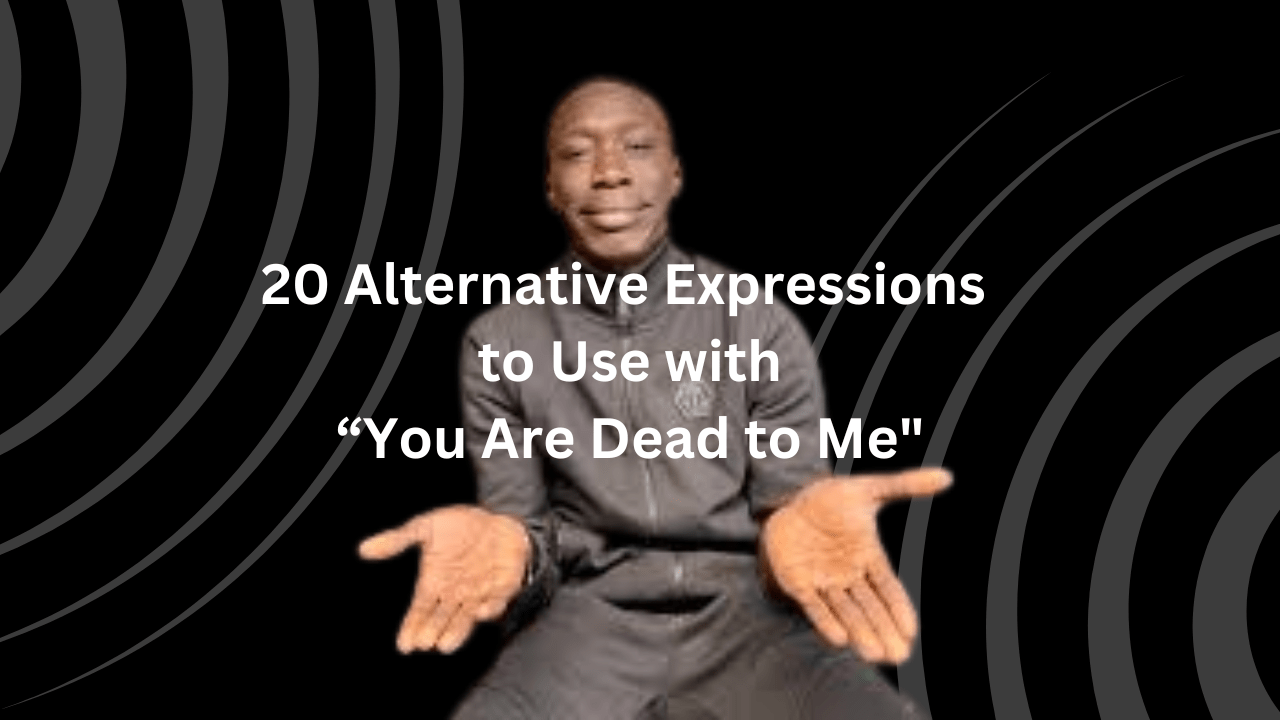In the realm of human relationships, there are moments when connections sour, bonds break, and sentiments shift. Amidst the turbulence of emotions, individuals often seek verbal expressions to articulate the depth of their feelings. One such phrase, “You are dead to me,” carries a weighty significance, signifying a profound sense of emotional detachment and severance.
However, there exist alternative expressions that convey a similar sentiment with varying degrees of intensity and nuance. In this article, we explore 20 alternative ways to communicate the notion of emotional disconnection while delving into the intricacies of human interaction and expression.
20 Alternative Expressions of “You Are Dead to Me”
“You are no longer a part of my life. You Are Dead to Me”
This straightforward and definitive statement denotes a conscious decision to exclude the individual from the narrator’s life entirely. It signifies a clean break from past associations, suggesting that the individual’s presence is no longer desired or welcomed.
By explicitly stating the absence of any ongoing connection, it allows both parties to move forward independently, free from the constraints of past relationships.
“I am closing the chapter on our relationship. You Are Dead to Me”
This metaphorical and symbolic expression likens the relationship to a chapter in a book, suggesting that it has reached its natural conclusion. By framing the relationship as a narrative arc with a distinct beginning and end, it emphasizes the closure of a significant chapter in the narrator’s life story.
This metaphorical closure allows for emotional processing and acceptance, paving the way for new beginnings and opportunities.
“Our paths diverge from this point onward. You Are Dead to Me”
This metaphorical expression paints a picture of diverging paths, symbolizing the divergence of life trajectories and the inevitable separation of the individuals involved. It conveys a sense of acceptance and resignation to the changing course of the relationship, acknowledging that their paths no longer align.
Despite the emotional distance implied by this statement, it allows for a sense of mutual respect and understanding, as both parties acknowledge and accept the inevitability of their separation.
“I am releasing you from my emotional ties. You Are Dead to Me”
This phrasing conveys the deliberate and conscious act of releasing oneself from emotional entanglements with the individual. It signifies a desire for emotional independence and autonomy, allowing the narrator to reclaim agency over their emotional well-being.
By relinquishing any lingering emotional attachments, it fosters a sense of liberation and empowerment, enabling the narrator to move forward with clarity and confidence.
“You have become a stranger to me. You Are Dead to Me”
This poignant statement underscores the profound sense of estrangement and unfamiliarity that has developed between the individuals. It acknowledges the loss of intimacy and connection, likening the individual to a stranger who is no longer recognizable or familiar.
Despite any shared history or past experiences, this expression emphasizes the irreparable rupture in the relationship, signaling the need for emotional distance and detachment.
“I am disconnecting from our shared history. You Are Dead to Me”
By referencing the shared history between the individuals, this expression highlights the conscious and deliberate act of disconnecting from past memories and experiences. It signifies a desire to break free from the emotional baggage associated with the relationship, allowing the narrator to move forward unencumbered by past attachments.
Despite the nostalgia or sentimentality that may accompany shared memories, this statement emphasizes the importance of emotional closure and moving on.
“Our bond has been irreparably severed. You Are Dead to Me”
This statement conveys the finality and permanence of the emotional rupture between the individuals, suggesting that the bond that once connected them has been irreversibly damaged. It acknowledges the impossibility of restoring the relationship to its former state, emphasizing the need for acceptance and closure.
Despite any lingering feelings of sadness or regret, this expression allows the narrator to come to terms with the reality of their situation, paving the way for healing and growth.
“I am relinquishing any attachment to you. You Are Dead to Me”
This phrase communicates the deliberate and intentional act of relinquishing any emotional attachment or dependency on the individual. It signifies a desire for emotional independence and autonomy, allowing the narrator to reclaim agency over their own feelings and emotions.
By letting go of any lingering attachments, it fosters a sense of liberation and empowerment, enabling the narrator to focus on their own emotional well-being and personal growth.
“You occupy no space in my heart or mind. You Are Dead to Me”
By metaphorically referencing the heart and mind, this expression conveys the absence of any emotional resonance or significance attributed to the individual. It suggests that the individual’s presence in the narrator’s life has become inconsequential and insignificant, devoid of any lingering feelings or attachments.
Despite any shared history or past experiences, this statement emphasizes the emotional detachment and distance that has developed between the individuals, allowing the narrator to move forward with clarity and resolve.
“Our connection has dissipated into oblivion. You Are Dead to Me”
This evocative language conveys the gradual fading away of the emotional connection between the individuals, ultimately leading to its disappearance into oblivion. It suggests that the once-strong bond that united them has evaporated over time, leaving behind a void of emotional emptiness and indifference.
Despite any attempts to salvage the relationship, this expression acknowledges the inevitability of its demise, allowing the narrator to come to terms with the reality of their situation and move forward with acceptance and grace.
“Our relationship has reached its final curtain call. You Are Dead to Me”
This theatrical metaphor symbolizes the definitive end of the relationship, marking the conclusion of its narrative arc. It suggests that the relationship has run its course and that further attempts to prolong or revive it would be futile.
Despite any feelings of sadness or nostalgia, this statement emphasizes the need for acceptance and closure, allowing both parties to move forward with dignity and grace.
“I am detaching myself from our past association. You Are Dead to Me”
By referencing the past association between the individuals, this expression conveys the deliberate act of detachment from shared memories and experiences. It suggests that the emotional bonds that once united them have become frayed or weakened over time, no longer serving as a source of comfort or support.
Despite any lingering feelings of attachment or nostalgia, this statement emphasizes the need for emotional detachment and autonomy, allowing both parties to move forward with clarity and resolve.
“You are now a distant memory to me. You Are Dead to Me”
This imagery evokes the idea of distance and remoteness, suggesting that the individual’s presence in the narrator’s life has become increasingly remote and insignificant. It implies that the memories and experiences shared between them have faded into the recesses of the narrator’s mind, no longer holding any emotional resonance or significance.
Despite any past connections or shared bonds, this statement emphasizes the narrator’s ability to move forward and create new memories without the burden of past attachments.
“Our once-shared intimacy has faded into nothingness. You Are Dead to Me”
This poignant statement conveys the erosion of intimacy and closeness between the individuals, resulting in the eventual dissolution of the emotional connection. It suggests that the emotional bonds that once united them have dissipated over time, leaving behind a void of emotional emptiness and detachment.
Despite any attempts to rekindle the flame of intimacy, this statement acknowledges the inevitability of its extinguishment, allowing both parties to move forward with acceptance and resignation.
“I am relinquishing any claim to our past connection. You Are Dead to Me”
This language emphasizes the renunciation of ownership or entitlement to the past connection between the individuals. It suggests that the emotional bonds that once tied them together have become frayed or weakened over time, no longer serving as a source of comfort or support.
Despite any lingering feelings of attachment or nostalgia, this statement emphasizes the need for emotional detachment and autonomy, allowing both parties to move forward with clarity and resolve.
“You are now a footnote in the story of my life. You Are Dead to Me”
This metaphorical imagery portrays the individual as a minor or insignificant detail in the broader narrative of the narrator’s life story. It suggests that the individual’s presence or absence has little impact on the overall trajectory of the narrator’s life, signifying a sense of emotional detachment and indifference.
Despite any past interactions or shared experiences, this statement emphasizes the narrator’s ability to move forward and create their own narrative, free from the constraints of past relationships.
“I am bidding farewell to our emotional entanglement. You Are Dead to Me”
By likening the emotional connection between the individuals to a form of entanglement, this expression conveys the desire to disentangle oneself from the emotional complexities of the relationship.
It suggests that the emotional bonds that once bound them together have become tangled or knotted over time, causing emotional distress or turmoil. Despite any feelings of sadness or regret, this statement emphasizes the need for emotional liberation and self-preservation, allowing the narrator to move forward with clarity and resolve.
“You exist in the periphery of my existence, no longer central. You Are Dead to Me”
This metaphorical language portrays the individual as occupying a peripheral or marginal role in the narrator’s life, emphasizing their diminished significance. It suggests that the individual’s presence or absence has little impact on the overall trajectory of the narrator’s life, signifying a sense of emotional detachment and indifference.
Despite any past interactions or shared experiences, this statement emphasizes the narrator’s autonomy and self-reliance, allowing them to prioritize their own emotional needs and priorities.
“Our emotional bond has withered away, leaving only echoes. You Are Dead to Me”
This poetic imagery conveys the gradual deterioration of the emotional bond between the individuals, resulting in the fading echoes of their past connection. It suggests that the emotional resonance that once defined their relationship has faded over time, leaving behind only faint echoes of what once was.
Despite any attempts to reignite the spark of their connection, this statement acknowledges the inevitability of its demise, allowing both parties to move forward with acceptance and resignation.
“I am severing the ties that once bound us, setting us both free. You Are Dead to Me”
This metaphorical language depicts the deliberate and decisive act of severing the emotional ties that once bound the individuals together. It signifies a desire for emotional liberation and autonomy, allowing both parties to move forward unencumbered by past attachments.
Despite any feelings of sadness or regret, this statement emphasizes the need for emotional closure and acceptance, enabling both parties to embark on separate paths with clarity and resolve.










